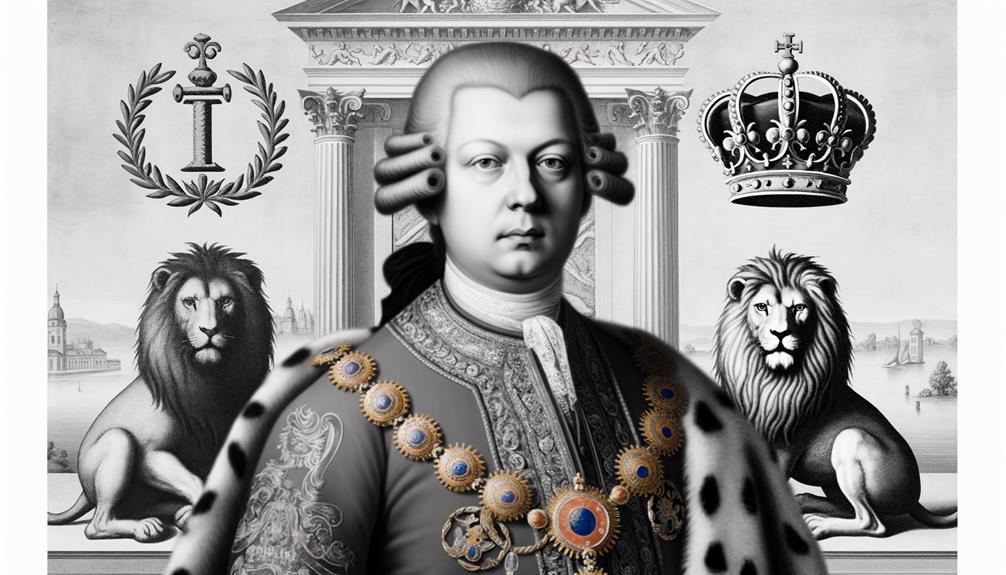The Meaning of the Name Charles
The name Charles, derived from the Germanic "Karl" meaning "free man," has transcended its origins through linguistic adaptation to become deeply embedded in Western culture. Historically, it has been borne by significant figures such as Charlemagne and Charles I of England, shaping political and religious landscapes.
In literature and popular culture, Charles conveys qualities of nobility and complexity, with figures like Charles Darnay and Charles Xavier embodying these attributes. Despite evolving naming trends, its enduring appeal remains evident.
This historical and cultural analysis underscores the name's significance through various epochs and contexts, offering deeper insights into its enduring legacy.

Key Takeaways
- The name Charles originates from the Germanic name Karl, meaning 'free man' or 'man.'
- Charles has historical significance, with notable bearers like Charlemagne and Charles I of England.
- It symbolizes authority and complexity in literature and media, such as in 'A Tale of Two Cities.'
- Famous individuals named Charles, like Charles Darwin and Charles Dickens, profoundly impacted their fields.
- Despite evolving naming trends, Charles remains a popular and timeless choice across generations.
Origins of Charles
Tracing its linguistic roots, the name Charles originates from the Germanic name Karl, meaning 'free man' or 'man.' This etymology reflects the socio-cultural significance attributed to personal freedom and identity in early Germanic societies.
The name Karl evolved into various forms across Europe, with Charles being the English adaptation. The transformation of Karl to Charles demonstrates the linguistic assimilation and adaptation processes that occur within language evolution. This adaptation is not merely phonetic but also semantic, often carrying cultural connotations reflective of the societal values at the time.
The name's endurance and prevalence across centuries underscore its enduring appeal, further solidifying its place in the lexicon of Western nomenclature. Understanding this origin provides a foundational insight into its longstanding usage.
Historical Significance
The name Charles holds considerable historical importance, being borne by numerous influential figures across various epochs, including kings, emperors, and saints.
Among the most notable is Charlemagne, or Charles the Great, who united much of Western Europe during the early Middle Ages, laying the foundations for modern France and Germany.
Additionally, Charles I of England's tumultuous reign led to the English Civil War, profoundly impacting the constitutional landscape of the British Isles.
Saint Charles Borromeo, a cardinal and archbishop in the 16th century, played a pivotal role in the Counter-Reformation, notably influencing the Catholic Church's direction.
These individuals illustrate the profound and diverse historical impact of bearers of the name Charles, shaping the political, religious, and cultural contours of their respective eras.
Cultural Impact
Spanning literature, film, and popular media, the name Charles has permeated cultural narratives, symbolizing various archetypes and influencing character development across genres. In literature, Charles often embodies nobility and complexity, as seen in characters like Charles Darnay from Dickens' 'A Tale of Two Cities.'
Film and television have similarly utilized the name to evoke a sense of gravitas or authority, evident in figures such as Charles Xavier from the 'X-Men' series. The name's versatility allows it to fit both heroic and villainous roles, reflecting its deep-rooted historical significance.
This multifaceted usage underscores how the name Charles enriches storytelling by providing a robust, culturally resonant identifier for diverse character portrayals.
Famous Bearers
Renowned individuals named Charles frequently emerge in various domains, exemplifying the name's prominence and enduring legacy.
In literature, Charles Dickens stands out as a seminal figure, his works profoundly influencing English literature.
In the field of science, Charles Darwin's theory of evolution reshaped biological sciences.
The political sphere showcases Charles de Gaulle, a pivotal leader in modern French history.
In the arts, Charles Chaplin's innovative contributions to film have left an indelible mark on cinematic history.
Each of these figures has not only attained individual acclaim but also contributed significantly to their respective fields, underscoring the name Charles as one associated with intellectual, cultural, and scientific advancements that continue to resonate globally.
Modern Popularity
In contemporary society, the name Charles maintains its relevance and appeal, frequently appearing in various cultural and demographic contexts. Despite the proliferation of modern and unconventional names, Charles remains a stalwart, reflecting both tradition and continuity.
Statistically, the name continues to be prevalent in birth registries, underscoring its enduring popularity. The name's adaptability is evident in its use across different socio-economic groups and its presence in both formal and informal settings.
Its historical gravitas, coupled with a sense of timelessness, renders it a preferred choice for parents seeking a name with both dignity and familiarity. Consequently, Charles's sustained usage highlights its ability to transcend generational shifts, securing its position as a perennial favorite in contemporary nomenclature.
Conclusion
In sum, the name Charles, with its origins rooted in the Germanic ‘Karl,’ has traversed centuries, leaving an indelible mark on history and culture. The name has been borne by numerous kings, emperors, and notable figures throughout history, solidifying its significance. Furthermore, in modern times, the name Charles continues to be popular and carries a sense of prestige and timeless appeal. In addition, the meaning of bellatrix, which is derived from Latin and conveys the idea of a female warrior, showcases the enduring strength and resilience associated with the name Charles.
Some may argue that its significance has waned in modern times; however, its enduring presence among notable figures and continued popularity attest to its lasting appeal.
The name's rich historical narrative and cultural resonance underscore its timeless relevance, evoking a profound sense of heritage and continuity.






